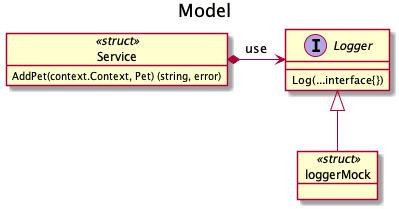"Choosing the right limitations for a certain problem domain is often much more powerful that allowing anything." - Jason Moiron
Problem
Sometimes, I mean, only when it is strictly needed, we need to verify that our application is generating expected logs. So, the question here is, how can I test that?
Below is the model for our log mechanism.
For this scenario, Service#AddPet() will print three logs that we expect to see in the output. Suppose we will be using JSON format for the Logs, then the result might be something like this:
{"action": "petstoreapp.Service.AddPet", "msg": "adding new pet", "pet": {"Family": "Dog", "Race": "Coker"}, "id": "1"}
{"action": "petstoreapp.Service.AddPet", "msg": "storing new pet", "pet": {"Family": "Dog", "Race": "Coker"}, "id": "1"}
{"action": "petstoreapp.Service.AddPet", "msg": "notifying new pet", "pet": {"Family": "Dog", "Race": "Coker"}, "id": "1"}
Solution
[1.] First, write the unit test we imagine. Note that it is also the solution to this problem.
package petstoreapp_test
import (
"context"
"testing"
"github.com/group/project/pkg/petstoreapp"
"github.com/stretchr/testify/assert"
)
func TestAddPetLogs(t *testing.T) {
// GIVEN
newPet := petstoreapp.Pet{
Family: "Dog",
Race: "Coker",
}
expectedLog := [][]interface{}{
{
"action", "petstoreapp.Service.AddPet",
"msg", "adding new pet",
"pet", petstoreapp.Pet{Family: "Dog", Race: "Coker"},
"id", "1",
},
{
"action", "petstoreapp.Service.AddPet",
"msg", "storing new pet",
"pet", petstoreapp.Pet{Family: "Dog", Race: "Coker"},
"id", "1",
},
{
"action", "petstoreapp.Service.AddPet",
"msg", "notifying new pet",
"pet", petstoreapp.Pet{Family: "Dog", Race: "Coker"},
"id", "1",
},
}
ctx := context.TODO()
logger := newLoggerMock()
idGenerator := idGeneratorMock("1")
petstoreService := petstoreapp.NewService(idGenerator, logger)
// WHEN
_, err := petstoreService.AddPet(ctx, newPet)
// THEN
if err != nil {
t.Errorf("unexpected error: %s", err)
}
assert.Equal(t, expectedLog, logger.logs)
}
Main points.
- We have an
expectedLogvariable with the list of parameters we will receive in the logs. - We pass the Mock Logger to the service instance.
- We verify that the logs generated in the
AddPet()function are equal to the value ofexpectedLog.
[2.] Create the logger mock.
package petstoreapp_test
// loggerMock
type loggerMock struct {
logs [][]interface{}
}
func newLoggerMock() *loggerMock {
return &loggerMock{
logs: [][]interface{}{},
}
}
// Log add given parameters to the internal log slice
func (l *loggerMock) Log(v ...interface{}) {
l.logs = append(l.logs, v)
}
[3.] Once our unit test is ready, we write the service AddPet() function.
package petstoreapp
import "context"
// Service defines behavior to save a pet.
type Service struct {
logger Logger
idGenerator IDGenerator
}
// NewService creates a new petstore service.
func NewService(idGenerator IDGenerator, logger Logger) *Service {
return &Service{
logger: logger,
idGenerator: idGenerator,
}
}
// AddPet add the given new pet and returns its id or an error if something
// goes wrong.
func (s *Service) AddPet(ctx context.Context, newPet Pet) (string, error) {
petID := s.idGenerator.Generate()
s.logger.Log("action", "petstoreapp.Service.AddPet", "msg", "adding new pet", "pet", newPet, "id", petID)
// do some logic to persist the new pet
s.logger.Log("action", "petstoreapp.Service.AddPet", "msg", "storing new pet", "pet", newPet, "id", petID)
// do some logic to notify the creation of the new pet
s.logger.Log("action", "petstoreapp.Service.AddPet", "msg", "notifying new pet", "pet", newPet, "id", petID)
return petID, nil
}
[4.] Now execute the unit test to see it is working well.
go test -timeout 30s github.com/group/project/pkg/petstoreapp -run ^TestAddPetLogs$
ok github.com/group/project/pkg/petstoreapp
Conclusion
- Most of the Logger mechanisms have a
Log()function that receives a list of parameters to print. - Remember that we should verify that we are sending the expected values to the Logger and not the way it is printed in the output mechanism.
- Dependency Inversion Principle: "Program to an interface, not to an implementation".
- In the unit test, we should have a Mock for the Logger in order to catch the expected parameters.



Top comments (0)